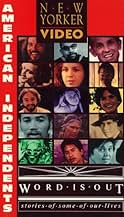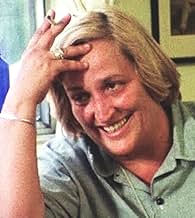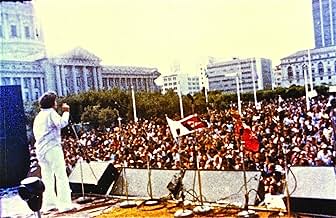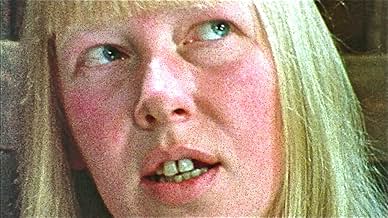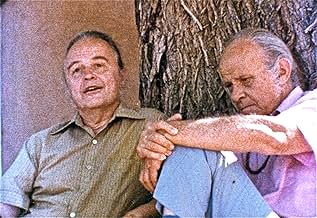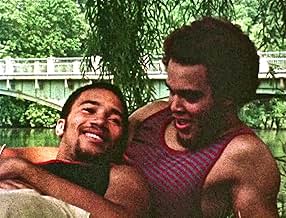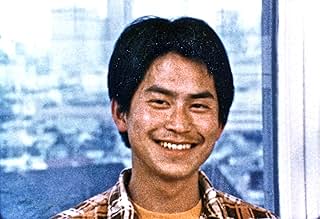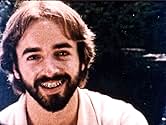Agrega una trama en tu idioma26 diverse lesbian and gay people are interviewed about their lives and the challenges they experience in a homophobic culture. A groundbreaking documentary is now an artefact of a different... Leer todo26 diverse lesbian and gay people are interviewed about their lives and the challenges they experience in a homophobic culture. A groundbreaking documentary is now an artefact of a different time.26 diverse lesbian and gay people are interviewed about their lives and the challenges they experience in a homophobic culture. A groundbreaking documentary is now an artefact of a different time.
- Premios
- 1 premio ganado en total
- Self
- (as Sally Gearhart)
- Self
- (as Roger Harkenrider)
- Self
- (as Whitey)
Opiniones destacadas
It wasn't until I saw this film that I realized my whole life I had been trying to relate to straight romances, conflicts, comedies, and life experiences in general on the screen. When the film was done I wanted to see it all over againimmediatelyto memorize the people and their stories. Every one of them said something that spoke to me very directly and strongly. I cannot explain or express my feelings after I watched, for the first time in my life, gay peoplehonestly and beautifullytell what it's like to live in this country. I finally knew I belonged to a culture. I didn't feel as though I had to hide. I was not sick. I was not alone.
My story is not an anomaly. It is impossible to count the number of lives this film has changed by publicizing positive images of gay Americans for the first time ever. For thousands of peoplegay and straightit broke down stereotypes. It makes gay people identifiable even for those buried in the heartland of homophobic America because it's really about the universality of love and discovering who we really are. Everyone should see this movie.
As a documentary film, there is a very nice flow between the stories, the generations, and the personalities. What shocks me now is how the film-making team was so skillful at getting the interview subjects to open up so much, to dig so deeply into their psyches, and to share their feelings with the audience. This is more than a fascinating view of LGBTQ people in 1977; it is a historical document on our lived experience in the second half of the 20th Century.
As much as I fell in love with the people who shared their stories, I also came to better terms with myself. Due to the film, I became real. I became a real person. I finally shared an experience with other people --even in far away, exotic places like San Francisco-- and I was a little bit less alone in the world than I had been before I saw the film.
I have thought about the film all my life since I first saw it. I have thought about how daring and powerful the people were who allowed themselves to appear in the film back in 1977. I have wondered if everyone has been able to find satisfaction and a measure of happiness in their lives after the film was made, and the anniversary edition of the DVD does a very nice follow up on the original cast.
The film was made less than ten years after the Stonewall Rebellion, and equal rights for the lesbian and gay community appeared then to be moving forward in a linear fashion. This belief in progress to come gave the film a hopeful quality. The movie also has a poignant quality, because so many of the people interviewed had suffered terrible discrimination, especially those who had been in the military.
Now, over 30 years later, we know that LGBT rights have moved ahead at a two-steps-forward-one-step-back pace, and almost all LGBT people are still facing discrimination, especially, of course, in the military.
Word is Out can stand on its own as an excellent documentary. If you care about the rights of LGBT people, it's a must-see film.
We saw the movie at the Dryden Theatre, as part of the splendid ImageOut: Rochester Lesbian and Gay Film Festival. The festival had obtained a newly restored 35mm print. Word is Out will work well on DVD and, apparently, the DVD version of the restored film is now available. Be sure to find it and watch it--it's an excellent film.
So many positive things stick out: The fact that none of the participants are angry or overly resentful; the fact that they are all candid, non-delusional and totally open to the questions; the fact that they are at their ease; the fact that they can tell everything about their past experience and still have hope in the future in spite of some occasional twangs of nostalgia for their "underground" life and of pain at what they have endured. I can't imagine (in a SF alternate universe), straight people being so forgiving if heterosexuality had been persecuted for thousands of years.
But the thing I found the most remarkable is that all the participants are so lucid and very articulate. Even the ones that are not scholarly (like the two women living as a farming couple in the country) express themselves in a clear, concise and honest manner. The same can be said of the few "flamboyant" gays. What they say ultimately makes sense, in spite of their expressiveness and their love of hyperbole. This kind of faculty for expressing the truth or simply communicating in a direct manner has totally disappeared from most of the gays I know today. It's as if these troubled times on the cusp of new era made people more intelligent and perceptive. Now that homosexuality is "more or less" accepted (except by inbred small-town Republicans), gay people seem to have lost some of that lucidity and that is very sad. Or maybe Americans have just gotten dumber as a whole with the influence of movies, television and video games and the loss of basic literacy due to a degrading education system. I'm just saying... It's interesting to note in that respect that the IMDb user ratings show that this film doesn't "connect" as much with the younger generations as it does with older viewers.
On the other hand, there is absolutely no reference by any of the participants to any concept, reality or news from outside the U.S. (except for a few insights on growing up Asian and gay or Black and gay), which to a non-American of today like myself, may seem strange. There are also very few references to the influence of the media. Even the most inarticulate, delusional, and misinformed gays of today know they live in a global media-controlled universe and can compare themselves to other parts of the world. But that is just another sign of the times, I guess. Today's young people take the global village for granted and that may not necessarily make them more intelligent, more self-aware or more informed about anything. And gay liberation was perhaps (arguably) first and foremost a North-American phenomenon, made possible by relative prosperity, democracy and the access to higher education.
The only things that can bring a smile or a wince today are the conscious and/or unconscious role-playing of some of the lesbian couples and the few mentions of "lesbian separatism" by some of the participants. But that is - and has always been - something for the feminists to analyze. And who's to say the male-male couples wouldn't have exhibited just as much butch-femme role-playing if they had actually been shown more?
In conclusion, I like the way the participants - despite all the rhetoric - mostly come off as thinking individuals first and gays second.
¿Sabías que…?
- TriviaAvailable to stream on the Criterion Channel as part of Pride and Protest: The Films of Rob Epstein and Jeffrey Friedman.
- Citas
Danny: It's really scary standing in isolation from everybody else and that's what I've feared most of my life. The fact that I wasn't part of, part of a group.
- ConexionesFeatured in No Secret Anymore: The Times of Del Martin & Phyllis Lyon (2003)
Selecciones populares
Detalles
- Fecha de lanzamiento
- País de origen
- Sitio oficial
- Idioma
- También se conoce como
- Word Is Out: Stories of Some of Our Lives
- Locaciones de filmación
- Productora
- Ver más créditos de la compañía en IMDbPro
Contribuir a esta página


